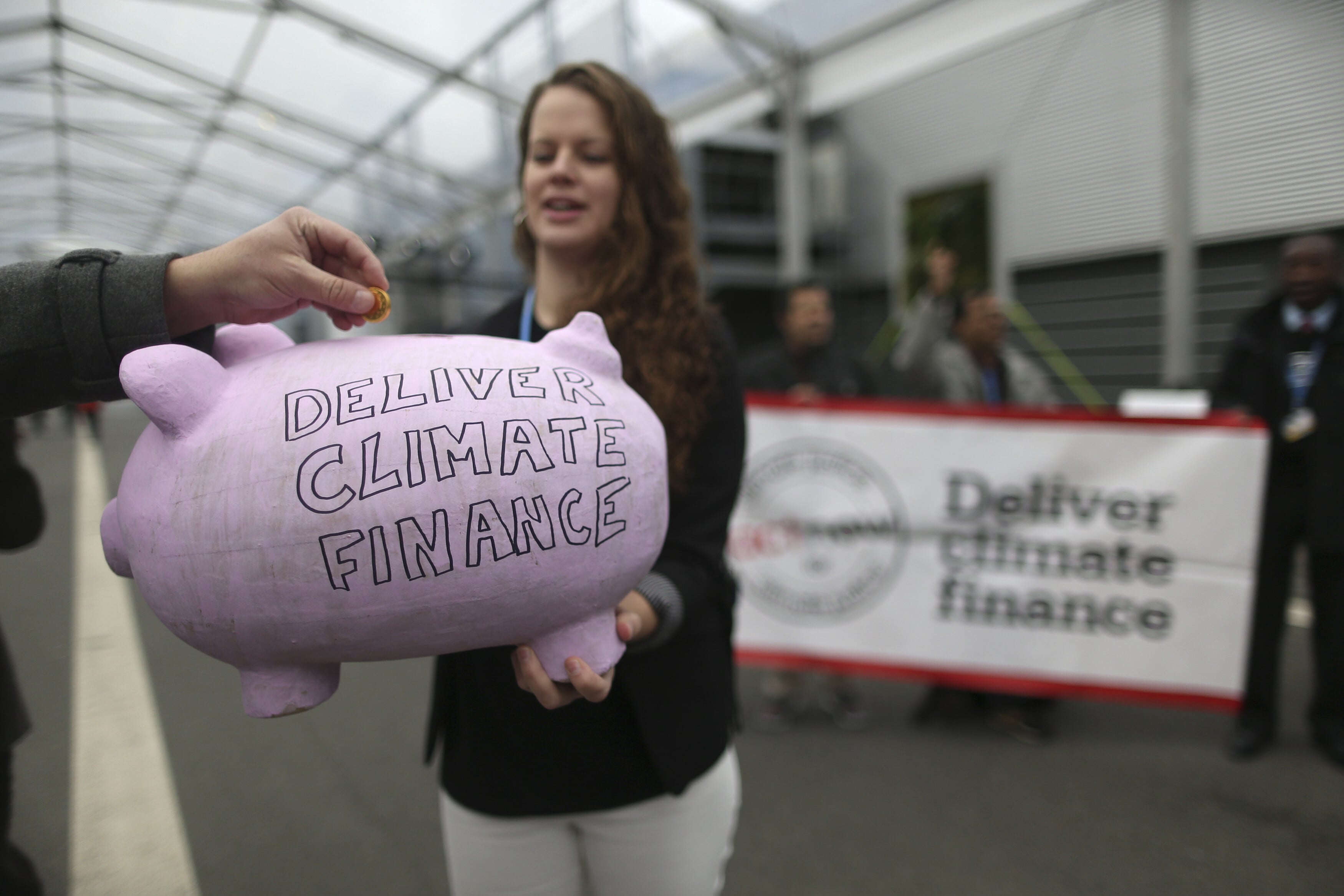Global public debt to exceed $100 trillion, says IMF - plus other economy stories to read this week

'Low growth and high debt' ... forecasts point to a 'difficult future' for the global economy, says IMF chief Kristalina Georgieva.
Image: Reuters/Hamad I Mohammed
- This weekly round-up brings you the latest stories from the world of economics and finance.
- Top economy stories: IMF projects global debt will surpass $100 trillion this year; China posts weakest GDP growth since 2023; Fall in UK inflation clears path for rate cuts.
1. IMF predicts global public debt will be at 93% of GDP by end of 2024
Global public debt will exceed $100 trillion by the end of this year unless major economies step up to stabilise borrowing, according to the International Monetary Fund (IMF).
The surge in government debt, driven largely by increased spending during the COVID-19 pandemic, continues to climb, with the US and China leading the way.
In its Fiscal Monitor, the IMF warns that without significant fiscal adjustments, global debt could approach 100% of gross domestic product (GDP) by the end of the decade, with countries like the UK, Brazil and South Africa also expected to see ongoing debt increases.
This news comes at the same time as the IMF highlights growing economic uncertainty. Risks from inflation, geopolitical tensions and climate disasters could raise chances of financial market volatility and slower global growth, the fund writes in a blog related to its Global Financial Stability Report.
“Our forecasts point to an unforgiving combination of low growth and high debt - a difficult future,” said Kristalina Georgieva, the IMF’s managing director, ahead of its annual meeting next week with the World Bank in Washington DC.
2. China’s sluggish Q3 GDP fuels stimulus pressure
China’s economy grew at its slowest pace since early 2023 in the third quarter, despite stronger-than-expected retail sales and factory output in September, Reuters reports.
GDP rose 4.6% year on year in Q3, just above the 4.5% forecast but below the second quarter's 4.7%. The struggling property sector remains a major drag on growth, prompting calls for further stimulus.
China's new home prices declined 5.8% year on year in September, marking the fastest drop since May 2015, despite efforts to revive the housing sector.
"The performance aligns with market expectations, given weak domestic demand and a struggling housing market," Bruce Pang, Chief Economist at JLL told Reuters. He added that recent stimulus measures "will take time and patience" to boost growth.
China's policymakers have ramped up stimulus. On Friday 18 October, the People's Bank of China announced two funding schemes that will inject up to 800 billion yuan ($112.38 billion) in the stock market through new monetary policy tools.
3. News in brief: Stories on the economy from around the world
Seven of the 10 major developed-market central banks are now easing monetary policy, reflecting growing concerns over economic growth, according to Reuters. The list includes the Swiss National Bank, the Bank of Canada, Sweden's Riksbank and the Reserve Bank of New Zealand. Central bank leaders stress their decisions will remain data-dependent as they navigate a challenging economic landscape, Reuters reports.
UK inflation unexpectedly fell to 1.7% in September, the lowest rate in three-and-a-half years, dipping below the Bank of England's 2% target and opening the door for potential cuts to the current 5% interest rate. The drop was largely driven by reduced airfares and petrol prices, reports the BBC.
How is the World Economic Forum improving the global financial system?
Meanwhile, the European Central Bank has cut interest rates by a quarter-point to 3.25%, reflecting growing confidence that eurozone inflation is weakening, says the Financial Times. This marks the lowest rate since May 2023 and follows a similar cut in September.
And US retail sales rose 0.4% in September, aided by lower petrol prices, while core sales jumped 0.7%. Weekly jobless claims fell by 19,000 to 241,000, though continuing claims increased to 1.867 million. The data reflects strong consumer spending and solid income growth, supporting expectations for a 25 basis-point interest-rate cut by the Federal Reserve next month.
The news comes as Denmark's central bank cut its key policy interest rate by 25 basis points to 2.85% on Thursday 17 October, in line with expectations, following the ECB's earlier decision to lower eurozone rates.
Elsewhere, Japan's core consumer prices increased by 2.4% year on year in September, exceeding the 2.3% forecast, primarily due to resumed fuel subsidies. Inflation excluding fuel remained steady at 2.1%. This data will be key for the Bank of Japan's policy meeting later this month, as a Reuters poll indicates that Tokyo's inflation may fall below the BoJ's 2% target.
The Central Bank of Egypt's Monetary Policy Committee has kept deposit and lending rates at 27.25% and 28.25% for the fourth straight meeting, according to Middle East Economy. Its main operation and discount rates are also unchanged at 27.75%, reflecting recent local and global developments after an 800 basis-point increase earlier this year.
Accept our marketing cookies to access this content.
These cookies are currently disabled in your browser.
4. More on finance and the economy from our blog
European Union members have hesitated to pool and expand financial resources, limiting funding for companies and stalling efforts towards a green transition. One economist argues that revamping capital markets could enhance Europe's competitiveness without compromising stability, while advocates believe a capital-markets union could foster the development of essential companies and infrastructure in an increasingly fragmented global economy.
The upcoming IMF and World Bank meetings provide a crucial platform for leaders to address pressing global economic challenges. Despite signs of optimism, fragile economic growth remains hampered by inflation, high debt and political uncertainty. To achieve significant progress in global recovery, strong collaboration and commitment from all stakeholders are essential, writes the Forum's Alem Tedeneke.
The informal economy, encompassing unregistered economic activities, accounts for a substantial portion of the global workforce. Supporting these workers is vital for achieving the UN's Sustainable Development Goals and fostering inclusive growth in underserved communities. Read more about how collaborative efforts among businesses, governments and local platforms can empower informal workers by granting them access to finance, training and technology.
Related topics:
More on Financial and Monetary SystemsSee all
Sandra Waliczek and Harry Yeung
July 29, 2025
Pranidhi Sawhney and Adam Skali
July 29, 2025
David Carlin and Sourajit Aiyer
July 28, 2025
Veronica Frisancho
July 22, 2025
Jesus Serrano
July 14, 2025





